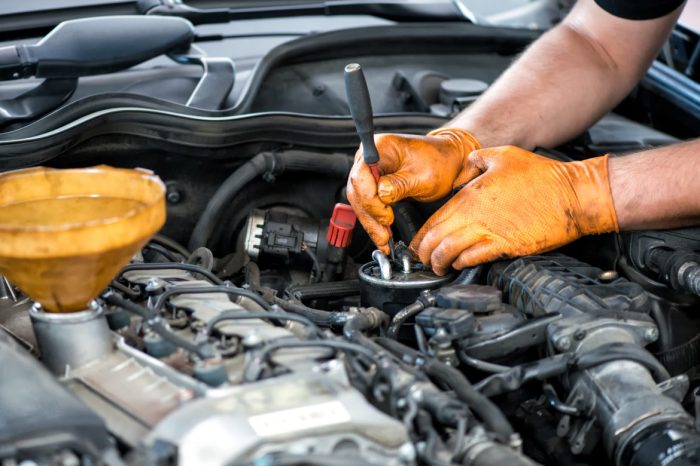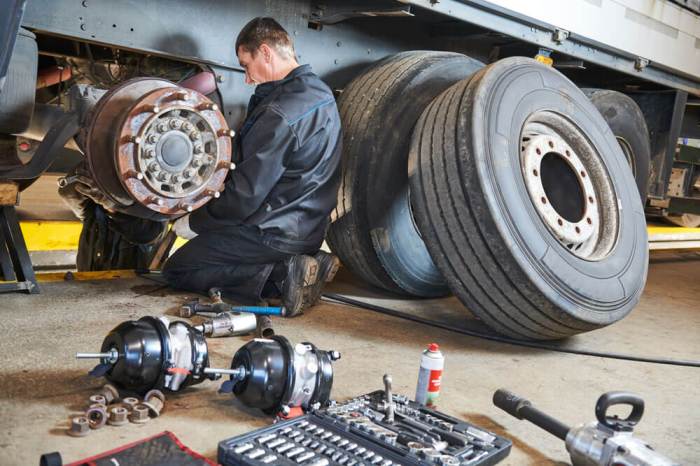Truck maintenance is key to keeping your wheels turning smoothly on the road. From routine tasks to signs that your truck needs attention, we’ve got you covered. So, buckle up and let’s dive into the world of truck maintenance.
Importance of Regular Truck Maintenance
Regular maintenance is crucial for trucks to ensure optimal performance, longevity, and safety on the road. By adhering to a maintenance schedule, truck owners can benefit in various ways while avoiding serious consequences of neglecting maintenance.
Benefits of Adhering to a Maintenance Schedule
- Prevent breakdowns and costly repairs: Regular maintenance helps identify and address minor issues before they escalate into major problems, saving money in the long run.
- Optimize fuel efficiency: Well-maintained trucks operate more efficiently, saving fuel costs and reducing emissions.
- Enhance safety: Proper maintenance ensures that all components of the truck are in working order, reducing the risk of accidents on the road.
- Extend vehicle lifespan: Routine maintenance helps extend the life of the truck, allowing owners to get the most out of their investment.
Consequences of Neglecting Truck Maintenance
- Increased risk of breakdowns: Neglecting maintenance can lead to unexpected breakdowns, causing delays and potential safety hazards.
- Reduced resale value: A poorly maintained truck will have a lower resale value compared to a well-maintained one, resulting in financial losses.
- Compromised safety: Neglected maintenance can result in faulty brakes, worn tires, or other critical issues that compromise the safety of the driver and others on the road.
- Lack of compliance: Failure to maintain trucks in accordance with regulations can lead to legal issues and fines, impacting the business operations.
Common Truck Maintenance Tasks

Regular maintenance is crucial to keep your truck running smoothly and to prevent breakdowns on the road. Here are some common maintenance tasks that every truck owner should prioritize:
Importance of Oil Changes
Regular oil changes are essential to keep your truck’s engine running efficiently. Engine oil lubricates the moving parts of the engine, reducing friction and preventing overheating. Over time, oil breaks down and becomes contaminated with dirt and debris, leading to engine wear and damage. By changing the oil at recommended intervals, you can prolong the life of your engine and ensure optimal performance.
- Change oil and oil filter every 5,000 to 7,500 miles, or as recommended by the manufacturer.
- Use the right type and grade of oil for your truck’s engine.
- Monitor oil levels regularly and top up as needed to prevent engine damage.
Checking Tire Pressure and Tread Depth
Proper tire maintenance is crucial for safe driving and fuel efficiency. Underinflated tires can lead to poor handling, increased fuel consumption, and premature tire wear. Checking tire pressure regularly and maintaining the correct levels can improve fuel economy and extend the life of your tires. Additionally, monitoring tread depth is important for traction and grip on the road, especially in wet or slippery conditions.
- Check tire pressure at least once a month and before long trips.
- Refer to the manufacturer’s recommendations for the correct tire pressure for your truck.
- Inspect tires for signs of wear and replace them if tread depth is below the recommended minimum.
Signs Your Truck Needs Maintenance: Truck Maintenance

If you want to keep your truck in top-notch condition, you gotta pay attention to the signs that indicate it needs some maintenance love. Don’t wait until it’s too late!
Unusual noises or vibrations coming from your truck can be a major red flag that something is not right under the hood. Whether it’s a squealing sound when you brake or a shaky steering wheel, these signs should not be ignored.
Dashboard Warning Lights, Truck maintenance
When those little lights on your dashboard start flashing like a disco party, it’s time to take notice. Whether it’s the check engine light, oil pressure light, or any other warning signal, these lights are there to tell you that your truck needs some TLC.
Weird Smells
If you start noticing strange odors coming from your truck, it could be a sign of a maintenance issue. Whether it’s a burning smell, a musty odor, or something else out of the ordinary, don’t overlook these olfactory cues.
Decreased Performance
When your truck starts feeling sluggish or struggles to accelerate like it used to, it could be a sign that maintenance is overdue. Keep an eye on your truck’s performance to catch any issues before they escalate.
DIY Truck Maintenance Tips
Performing basic maintenance on your truck can save you time and money in the long run. By taking care of simple tasks yourself, you can ensure your truck stays in top condition. Here are some tips for DIY truck maintenance:
Checking and Replacing Air Filters
Regularly checking and replacing your truck’s air filters is essential for maintaining good air quality and optimal engine performance. Here’s how you can do it:
- Locate the air filter housing in your truck’s engine compartment.
- Remove the old air filter carefully to avoid spreading dirt and debris.
- Inspect the filter for any signs of damage or clogging.
- If the filter is dirty or damaged, replace it with a new one that fits your truck’s make and model.
- Secure the air filter housing back in place and ensure it is tightly sealed.
Inspecting and Changing Truck Fluids
Regularly checking and changing your truck’s fluids is crucial for proper maintenance and performance. Here’s how you can inspect and change truck fluids:
- Refer to your truck’s owner’s manual to identify the locations of the various fluid reservoirs.
- Check the levels of engine oil, transmission fluid, brake fluid, and coolant regularly.
- If any of the fluids are low or dirty, follow the manufacturer’s recommendations for topping up or replacing them.
- Use the appropriate type of fluid for your truck to ensure proper functioning.
- Dispose of old fluids properly and securely tighten the reservoir caps after filling.